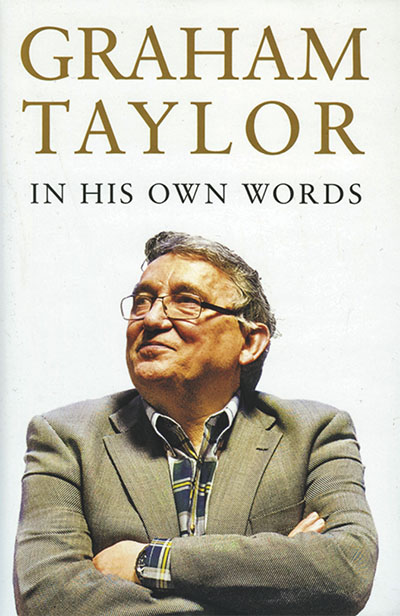Search: ' Paul Gascoigne'
Stories
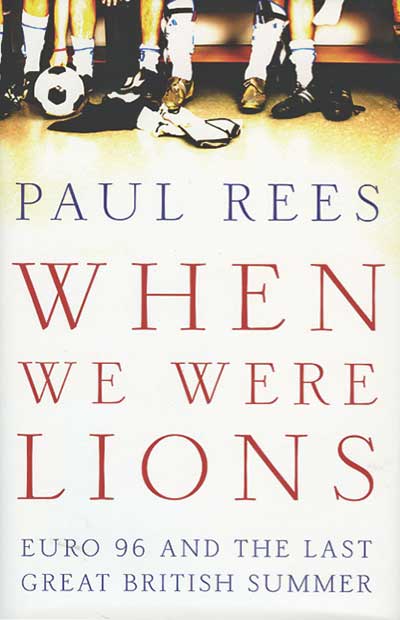 Euro 96 and the last great British summer
Euro 96 and the last great British summer
by Paul Rees
Aurum, £18.99
Reviewed by Si Hawkins
From WSC 353 July 2016
There’s something oddly masochistic about our ongoing desire to wallow, at length, in massive disappointments. This book may well be one too, for those attracted by the title: 311 pages long, its Euro 96 coverage ends on page 189, which may come as a surprise. But then When We Were Lions isn’t strictly a football book.
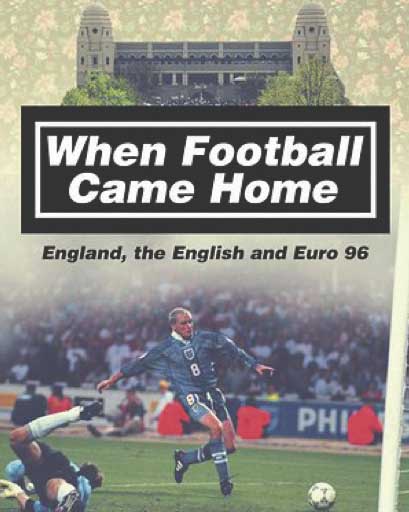 England, the English and Euro 96
England, the English and Euro 96
by Michael Gibbons
Pitch Publishing, £12.99
Reviewed by Jonathan O’Brien
From WSC 352 June 2016
It’s now 20 years since Euro 96, a relentlessly mediocre, often sparsely attended tournament won by an unexceptional Germany team that stumbled over the line carrying a busload of walking wounded. Realistically, it should be best forgotten. Yet, oddly, it continues to exert a strong hold over English football’s folk memory. Not because of the standard of play, or because England achieved anything beyond a restoration of respectability, but… just because. For better or worse, its name has come to evoke an unrepeatable moment in time.
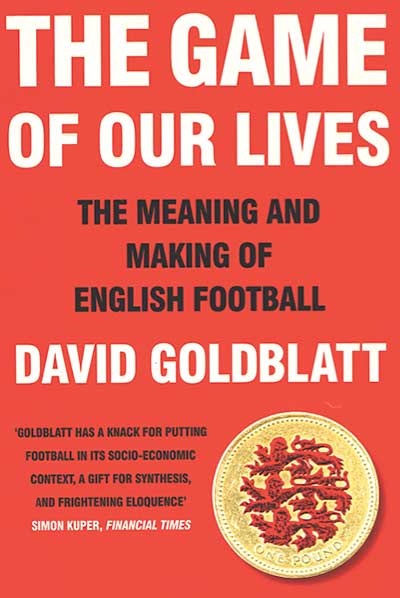 The meaning and making of English football
The meaning and making of English football
by David Goldblatt
Viking/Penguin, £16.99
Reviewed by Alan Tomlinson
From WSC 335 January 2015
David Goldblatt writes with the authority of a serious academic theorist of the globalisation process, but displays a lucidity and fluency to match the best feature journalists and sport writers. In The Game Of Our Lives he draws on specialist journalism, consultancy reports, arcane academic findings, new media and personal observations to analyse how English football has both mirrored and anticipated the broader neo-liberal agenda over the last two or three decades. Citing JK Galbraith in his conclusion, Goldblatt argues that English football represents the triumph of unaccountable affluence for the few over the many whose experiences and hopes are increasingly defined by the deprivations that denies them access to the game’s new riches.
The book confirms how swiftly the Premier League seized power in the early 1990s, and how timid the FA were in defence of the traditional values of the game. There may have been reviews, commissions and discussion of the need for serious change and modernisation; but the FA never managed to act, beyond the backing of the Taylor report for reform following the Hillsborough tragedy. Yet the consequent modernisation of grounds, in significant levels publicly funded in the name of community and civic goals, was a transformative project that Rupert Murdoch must have thought was a ruse or a booby-trap. But no, here it was on the eve of transnational satellite broadcasting: a cleansed and modernised infrastructure for him to buy into and sell on worldwide. Rarely has any besieged culture handed the battering-ram to the invasive aggressor in such a naive and timid way.
Goldblatt knows the sport too, and this is far from any dry history of the economics and politics of the game. He conveys the enduring cultural appeal of football, the resonance of matchday in the face of the forces of “fragmentation and distraction” that the new mobile media bring to bear in threatening the crowd’s “unbroken engagement and shared experience”. Analyses of the culture of the game, including the lost genius of the flawed Paul Gascoigne and the global profile of the feted metrosexual David Beckham, alternate through the book with vignettes on the political and economic realities of the emerging neo-liberal agenda. He illuminates the meaning of the game in its Premier League phase, balancing an evocation of its excellence and attractions with a critique of its financing and governance, reminding us too of the collective values that originally made football possible in its modern form, and of the game’s capacity to offer models of co-operative endeavour.
In a synthesising achievement of this scale, errors will certainly have crept in, and Burnley’s former chairman Barry Kilby is presented as “benefactor… Barry Kidder”. Wigan Athletic were formed in 1932, not “the late 1970s”, which was when they replaced Southport in the League; England’s “first defeat by a foreign team at home” was not the Hungarian lesson at Wembley in 1953, but a 2-0 loss to Ireland at Goodison Park in 1949. But this is a superb study that will surely inform and sustain debate on the nature and culture of the game, and the impact of the excesses of the Premier League upon football’s rich cultural legacy.
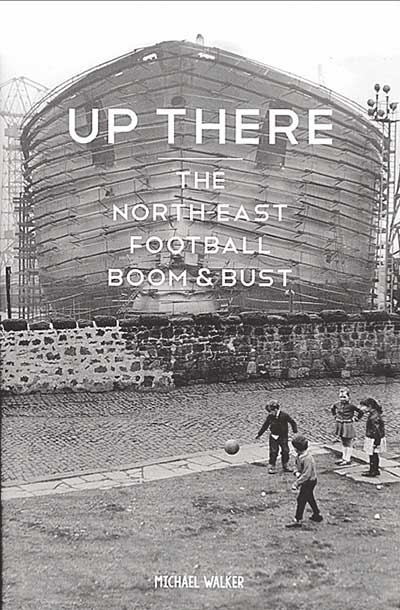 The north-east, football, boom & bust
The north-east, football, boom & bust
by Michael Walker
DeCoubertin Books, £16.99
Reviewed by Paul Brown
From WSC 334 December 2014
In 1960 the BBC journalist Arthur Appleton wrote a still-admired portrait of north-east football called Hotbed of Soccer. The title was apt, the book being published between Jackie Milburn’s Newcastle winning the FA Cup three times in the 1950s, and Bobby and Jack Charlton’s England winning the World Cup in 1966. The north-east had long been regarded as football’s great nursery, producing a succession of fine players and influential managers.
Yet Appleton recognised that the area’s influence on British football was waning. Its clubs were in decline and its players were leaving the region. As cases in point, Newcastle have not won a domestic trophy since the 1950s, and neither Charlton brother played for a north-east team. Even from his 1960 vantage point, Appleton was inclined to look back. “When the present has been temporarily exhausted, there is the rich past to be peeped into,” he wrote.
Fifty-four years later, Michael Walker explores that rich past, and the unavoidably depressed present, in Up There, an excellent and long-overdue social history of north-east football. From the game’s earliest years, Walker shows how the industrial north-east established itself as a football powerhouse. Cash-rich Sunderland won the Football League four times by 1902 and innovative Newcastle won the League three times, and the FA Cup, by 1910. There was a seemingly infinite stream of great players, from Colin Veitch, Raich Carter and Wilf Mannion to Stan Mortensen, George Camsell and Stan Anderson (who, uniquely, captained Newcastle, Sunderland and Middlesbrough).
Some became great managers. Brian Clough and Don Revie both grew up in terraced houses in Middlesbrough. Bob Paisley and Bobby Robson, like many of the region’s most prominent football characters, came from mining communities. As Walker discovers via a series of insightful interviews, mining and other industries were central to the success of north-east football, providing structure and stability for community teams and local players. When north-east industry took hits, so did north-east football, particularly after the wars, and then, fatally, during the brutal 1980s.
The 1990 World Cup represented something of a last hurrah. England’s starting XI included four north-east players in captain Bryan Robson, Paul Gascoigne, Peter Beardsley and Chris Waddle, plus manager Bobby Robson. By the 2014 World Cup, England’s sole north-east-born starter was Jordan Henderson. Henderson is one of the few remaining north-east players in the Premier League, with Steve Bruce the only north-east manager.
The decline of north-east football at all levels is well illustrated when Walker presents Durham FA secretary John Topping with a 1983-84 yearbook, and asks what has happened to its list of 16 youth leagues. “Gone. Gone. Gone…” replies Topping. Only two of the 16, he explains, are still around.
Walker does manage to find some causes for optimism. The pioneering Northern League is celebrating its 125th anniversary this year, Gateshead are pushing for a return to the Football League and Middlesbrough are challenging for promotion to the Premier League. At junior level, Northumberland’s Pinpoint League is thriving, catering for 12,500 young players. “It’s a mini-revival,” the Pinpoint League’s Ian Coates tells Walker. “In five years’ time I think what you’ll see are more local boys and better local boys playing for the big north-east clubs.”
